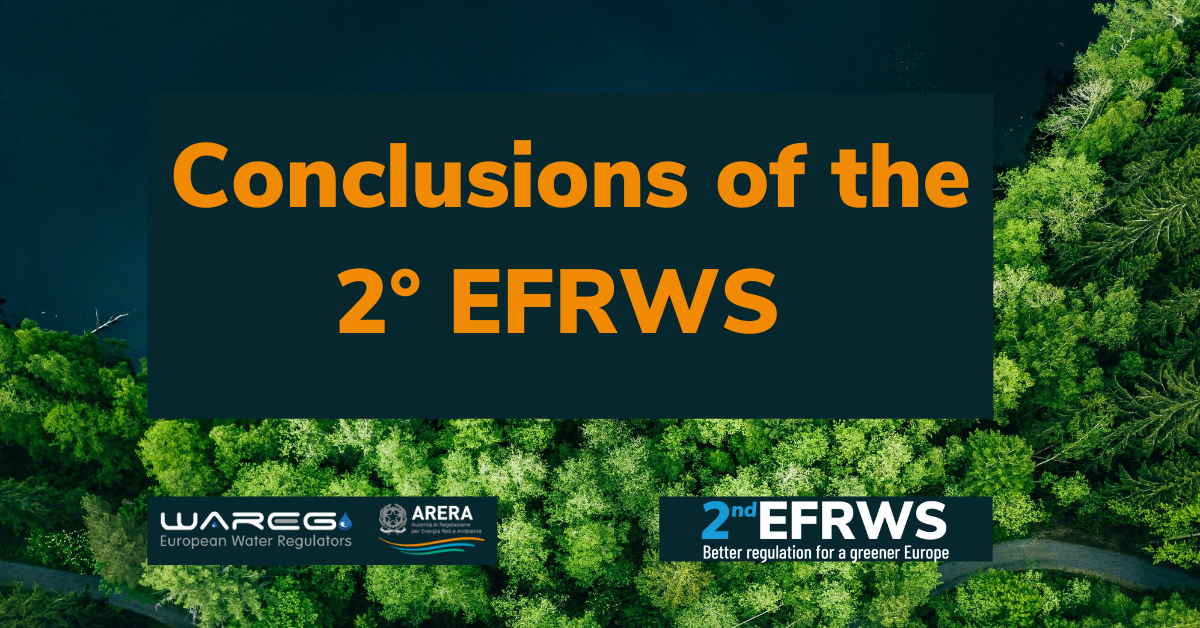
Conclusions of the 2nd European Forum on the Regulation of Water Services
In Europe, there are many ways to regulate the water sector from an environmental and economic point of view. The various types of regulatory models currently in place are strictly connected to local, regional and national rules adopted in the country. In terms of governance of the water sector, independent regulators have emerged as powerful public authorities to ensure compliance with the relevant EU Directives and Regulations, especially in countries which were lagging behind meeting EU targets.
Compliance with EU water legislation has significantly increased in those countries since water regulators started to operate there. Since 2014, countries failing to meet EU requirements on wastewater collection for example dropped by 44%, while failure to meet requirements on biological treatment and nutrient removal went down by 66% and 22% respectively. For the removal of phosporus and nitrogen from wastewater, regulatory authorities – members of WAREG – have allowed these countries to catch-up to average compliance levels in Europe. In other words, water regulatory authorities lead to greater compliance with EU regulation.
So much work has been done to improve the quality of water services and now for regulators, it is time to address the new challenges stemming from the EU’s decarbonisation policies and respond with effective regulatory tools to promote environmental sustainability.
The water authorities in WAREG can serve as the eyes of the European Commission regarding specific barriers that prevent full compliance with EU water legislation, from a purely regulatory point of view. Water regulators have in-depth knowledge of the needs of the water industry and of consumers. They are able to collect and analyse relevant data. In this sense, WAREG and its members can contribute to a faster pace towards the net-zero ambitions in the water sector.
Although each EU Member State is free to decide the role and powers of its regulators in meeting the EU decarbonisation objectives, some of them are acting as first movers and have already developed incentive tariffs to cover new circular economy practices in the water industry, like energy production from hydropower plants in water mains, recovery of chemicals from sludge, biogas production from bio digestors. Some regulators have introduced specific tools to incentivise new streams of investment in infrastructure, focused on nature-based solutions and net-zero solutions.
Where a clear mandate to promote environmental sustainability through regulation is missing, some water authorities are launching innovative tools such as specific funds and derogations to existing rules for regulated operators who are able to put in place projects with positive environmental externalities.
What key messages came out of the second European Forum on the Regulation of Water Services?
- WAREG regulators can ensure a uniform tariff methodology at country level
- Regulatory tools currently in place around Europe are gradually converging towards common standards in terms of water and wastewater service quality targets and general principles followed in the tariff methodologies, to remunerate investment risk to achieve the EU Green Deal goals
- WAREG regulators are ready to work together with the EU institutions for effective implementation of the Green Deal ambitions. Regulators believe that the future reforms of the Urban Water and Wastewater Treatment Directive and the Sewage Sludge Directive for agricultural usages should open a window of opportunity to recognise the importance of regulatory levers as effective tools to improve the quality of water services and to achieve net-zero targets
——————————————————————————————————————————————
By its “no-one-size-fits-all” approach, WAREG, the Association of European Water Regulators, promotes the development of regulatory tools in support of innovative and sustainable water management practices in Europe. WAREG members work together to exchange best practice on data collection and sectoral monitoring, advocacy and support to policymakers and better and faster implementation of European standards. For example, by deploying existing regulatory tools on the technical quality of water services, the Italian case has shown a growing trend in investments and in the compliance with standards, increasingly adapted to European objectives. A shared toolbox at European level can give the right impetus to the achievement of the objectives of the EU Green Deal.